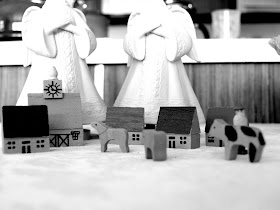One night, after the children were in bed, I went into Hans' study and started spewing information about pregnant humpback whales, the growth spurt of baby humpbacks (100 pounds a day), and how they nurse (40 times a day, yielding about 130 gallons of milk, 50% milkfat). Fascinating stuff, right?
I stopped when I saw a huge grin on Hans' face. "What is so funny?" I demanded. "You are talking about
breastfeeding whales," he responded.
OK, fine. I can see how that can be perceived as a little weird.
I blame this on motherhood. Emeth gave me his sea-creature-fever and I didn't even know it.
 |
Mommy cow scolded baby cow for standing on the train tracks.
|
 |
| The train was, of course, carrying an octopus and a shark. |
These are familiar sights around our home. This is Emeth's world. And it has become our world. Colliding stories. They make perfect sense in the mind of their creator, "Mommy, let me tell you a story. One day..."
Emeth lives
in stories; and Emeth lives
out stories.
During dinner one night, he was licking rice off the his plate.
When I reprimanded him, he answered: "Emeth is not a cow?" Ah, thank you for the explanation. I am never
sure where we are during our walks anymore, "Emeth, are we a school of fish
in the coral reef (the bushes) or are we trains on the tracks (the
sidewalk)?" I need to pay
more attention.
I am well aware that one of the biggest advantages I have over all the
other voices in his life is that I get to tell him his first stories. Stories make his world.
Stories draw boundaries between light and darkness, day and night, sea
and sky, right and wrong, good and bad. Stories give him people and things to love.
 |
| Mr.Squash meeting the wild animals at the zoo. |
Hans found it slightly disturbing when I became fascinated with North Korea. I was digging around the web for articles, videos, pictures, anything really. And as always, after the children were in bed, I sat in Hans' study and spewed information.
How do they bear
the weight of their fear? How do they endure
the silence and the emptiness of their streets? How did they become
so deceived?
Stories.
The same can be said for the concentration camps during World War II. Or how people captured other human beings and make them slaves. Or how pimps deceive young girls into prostitution. They each began with a story -- very, very bad ones.
We expect to be entertained when we walk into the cinema. As we drive down the highway, we are bombarded by streams of billboards. Movies, dramas, video clips, reality shows, commercials, books, the news. We think we are above them. We think they are harmless. In fact, we don't think very much of them at all.
Kim Jong Il, the dictator of North Korea,
thinks very much of these things. He knows the power of storytelling. Some call it propaganda. Actors and actresses in North Korea are handpicked by Kim Jong Il, and they are counted among the most privileged of the country. They live and
perform to give joy to their "Dear Leader."
In Pyongyang, there is a shrine dedicated to the "Dear Leader." Well, actually he has many shrines, but this particularly one is a museum of cinematography, in which he is the star. Of all things, the people revere him as a genius of the cinema, the theater, and the circus. Prime ministers and presidents of other nations do not receive such praise in these fields. But it seems that his strategy works, the level of control Kim Jong Il has on his subjects is astounding.
When I spewed information about North Korea on my sister Catherine (my poor family), she thoughtfully responded: "I wonder whether
I am living in a delusion?"
Yes, of course we are. Like children, we live
in stories, and we live
out stories. But unlike children, we don't think very much of them. In fact, we don't think very much at all.















































